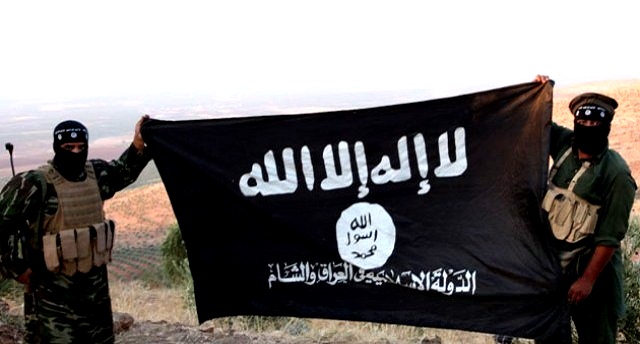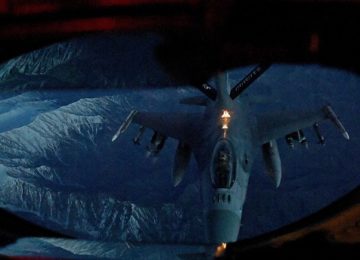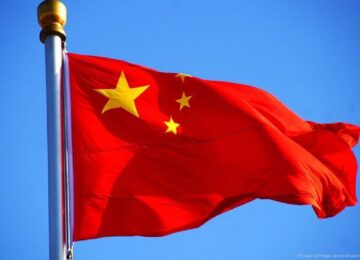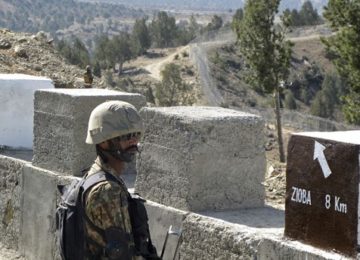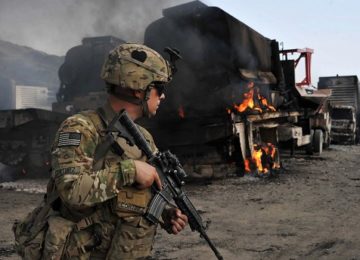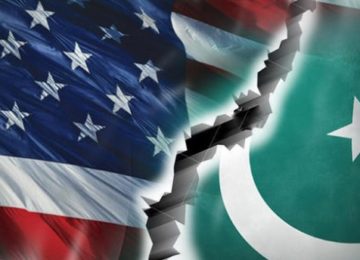December 21, 2017
The growing political instability and weak security apparatus in Afghanistan is encouraging the Islamic State – or Daesh – to spread its tentacles and wrest more territories in the country’s northern and eastern provinces.
Though Afghan President Dr Ashraf Ghani is claiming that the network is ‘on the run’, in reality the group – after having had to face the onslaughts of both Taliban militias and government forces in Afghanistan’s eastern provinces – is now moving up fast to the northern provinces. This is now stirring security fears in the bordering Central Asians Republics, popularly known as ‘Russia’s soft underbelly’.
The rising fears of Daesh gaining an advantage are not just random perceptions or gossip by men on the streets. This fear and imminent threats is disturbing the Afghans quite visibly – both in the streets and in power circles in Kabul.
Talking to a delegation of visiting Pakistani journalists at his residence in the highly secured Wazir Akbar Khan locality in Kabul, Dr Abdullah Abdullah – the chief executive officer in the National Unity Government – minced no words when sharing his own worries about the increasing footprints of the terror network in the northern provinces of Afghanistan.
“No doubt [the] Taliban militia is fighting against Islamic State in eastern provinces [but strangely] both are united and acting as one [group] in the northern provinces of Afghanistan”. This from the second most powerful man in the Afghanistan’s Unity Government.
Dr Abdullah was not playing naïve at all while talking to Pakistani media persons about the growing threats posed by Daesh. He was definitely aware that his senior partner in the NUG, Afghan President Dr Ashraf Ghani, categorically stated just a day earlier that “the terror network [Daesh] is on the run” and “nine districts of the country [where the group had hideouts] have been cleared of Daesh.” The president had said this while speaking at a ceremony in connection with handing over control of border police to the Ministry of Defence in Kabul.
Dr Ghani’s claims of eliminating the Daesh network came in response to persistence accusations levelled by leaders of the political opposition in Afghanistan and by members of parliament against [certain] elements in the ruling administration that they have been supporting Daesh in the Khorasan province in the country’s eastern areas.
“When the [military] operations begin, the Taliban are being bombed while the Daesh fighters are not bombed”, Ahmad Ali Hazrat – the chief of the Provincial Council of Nangarhar – was quoted by the media. He was essentially accusing the [NUG] government of supporting Daesh/Islamic State locally known as the Islamic State of Khorasan (ISKP).
Astonishingly, at the moment – as stated by a senior Afghan political leader – the fears of Daesh growing strong are ‘omnipresent’. These fears seem to have fast replaced similar threats that were earlier posed by the Taliban militias.
Although President Ghani claims to have gained successes against ISKP in Afghanistan’s eastern provinces bordering Pakistan, those who know the security environment believe that out of a total of 34 provinces of the country, 16 are dominated by Daesh. According to these observers, the Islamic State is taking advantage of the overall deteriorating security situation across the country. Taliban insurgents are gaining control of more and more areas, pushing back the Afghan security forces to the districts and provincial centres.
With the increasing influence of Daesh in the country’s east and north, the Afghans are becoming more and more sceptical about the role of the US-led Nato allies and their own government vis-a-vis the terror group.
Previously, it was former Afghan president Hamid Karzai who had been publically accusing the United States of financing and supporting the Daesh network in Afghanistan after transporting planeloads of the group’s activists to the country’s eastern provinces. Now more political leaders, jihadi commanders and political analysts are joining the bandwagon of the former president and questioning the role of the US-led Nato forces and the NUG in the fight against Daesh.
A senior political leader from the Paktika province who is also a member of the parliamentary committee on international relations says that he had proof of US forces supporting the terror network both financially and in providing transportation from one area to another. He claims that the majority of his colleagues in the Afghan parliament suspect American efforts in the fight against the ISKP.
Interestingly, besides parliamentarians and leaders of the political opposition, even common citizens in Afghanistan are talking about ‘unmarked helicopters’ – which many Afghans believe were used to transport Daesh activists from the east to the north. They also wonder about the sources of what seems to an abundant supply of money to the terror network.
A senior leader of the Unity Government also confided that Russia is very disturbed by the increasing footprints of Daesh in the northern parts of Afghanistan. According to him, “We have reports [that] Russia is arming local armed [former mujahideen] groups to fight against the Taliban and Daesh duo in the northern provinces bordering Uzbekistan and Tajikistan”.
Mirwais Yasini, the deputy speaker of the Wolesi Jirga from the Nangarhar province in the east, while downplaying the accusations against the NUG and the US supporting the terror group, said the group is not only increasing its footholdsin more areas but that its supporters and activists are also increasing.
Yasini, who contested for the office of president against Hamid Karzai, says that the majority of the Hizb-e-Islami activists, who were against the peace deal of their leader Gulbaddin Hekmatyar with the government, have joined the terror group. He fears that the hardcore fighters of the Taliban militia, who are currently dead set against any peace negotiations with the Kabul government, will also definitely join the terror group in case the militia’s leadership strikes any agreement with the government.
According to Yasini, the current government in Afghanistan is seen as incompetent, and Ghani proved as a weak leader, with the foreign forces mostly unable to read the writing on the wall.
The instability and deteriorating security environment can be gauged from the fact that parliamentary elections in Afghanistan have been getting delayed for the last two years consecutively. “We have planned to hold parliamentary elections in mid of next year InshaAllah”, says Dr Abdullah. Following that immediately by saying that: “When we say ‘InshaAllah’, Western leaders believe we are not serious in doing the job.” Like many Afghans, Dr Abdullah himself doesn’t seem sure if the government will be able to conduct the elections or not.
There was a time when foreigners would move around in Kabul – in armoured vehicles, of course. Now, though, the movement of foreign nationals is completely restricted to their official compounds or embassies. At a dinner at Pakistan House Kabul, we heard Western diplomats saying that the situation has become so worst that a number of countries have totally restricted the movement of their diplomatic staff in Kabul.
This article was originally published in The News international on December 21, 2017. Original link.
Disclaimer: Views expressed on this blog are not necessarily endorsed or supported by the Center for Research and Security Studies, Islamabad.



